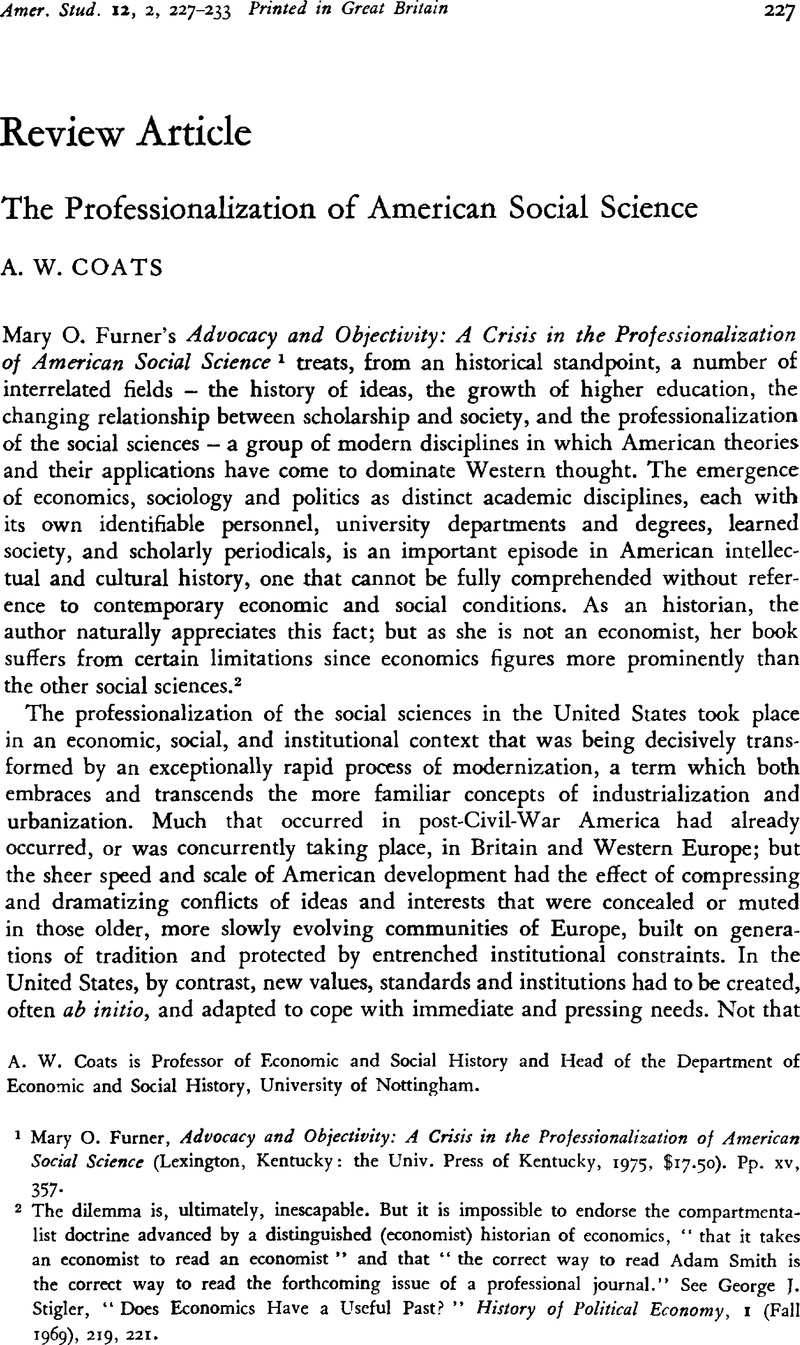Article contents
The Professionalization of American Social Science
Published online by Cambridge University Press: 16 January 2009
Abstract

- Type
- Review Articles
- Information
- Copyright
- Copyright © Cambridge University Press 1978
References
1 Furner, Mary O., Advocacy and Objectivity: A Crisis in the Professionalization of American Social Science (Lexington, Kentucky: the Univ. Press of Kentucky, 1975, $17.50). Pp. xv, 357Google Scholar.
2 The dilemma is, ultimately, inescapable. But it is impossible to endorse the compartmentalist doctrine advanced by a distinguished (economist) historian of economics, “ that it takes an economist to read an economist ” and that “ the correct way to read Adam Smith is the correct way to read the forthcoming issue of a professional journal. ” See Stigler, George J., “ Does Economics Have a Useful Past? ” History of Political Economy, 1 (Fall 1969), 219, 221CrossRefGoogle Scholar.
3 As F. W. Taussig wrote to H. C. Adams, “ We must look to the Germans for suggestions, but must work out our salvation in our own way — a fact which some of our friends are apt to overlook ” (Furner, p. 91).
4 It is worth noting that Furner barely mentions the American Historical Association (1884), which formed part of the same general movement, presumably because she does not regard history as a social science, although it has been included within the domain of the (US) Social Science Research Council. Incidentally, the date of formation of a scholarly society is an unreliable guide to the professionalization of the discipline in question. History in America was dominated by amateurs until the early years of this century. See Higham, John, History: The Development of Historical Studies in the United States (Englewood Cliffs, New Jersey, 1965)Google Scholar.
5 For a lively, but not altogether satisfactory, survey see Hofstadter, Richard, Anti-Intellectualism in American Life (New York, 1962)Google Scholar.
6 Veysey, Laurence R., The Emergence of the American University (Chicago, 1965)Google Scholar is an excellent general introduction to the subject. See also Rudolph, Frederick, The American College and University (New York, 1962)Google Scholar.
7 The pioneer work is Hofstadter, Richard and Metzger, Walter P., The Development of Academic Freedom in the United States (New York, 1953)Google Scholar. This was subsequently republished, under the respective authors' names, as Academic Freedom in the Age of the College, and Academic Freedom in the Age of the University.
8 In addition to the Hofstadter and Metzger study cited in the preceding footnote the main general works are MacIver, Robert, Academic Freedom in Our Times (New York, 1955)Google Scholar; and Lazarsfeld, Paul and Thielens, W., The Academic Mind, Social Scientists in a Time of Crisis (Glencoe, Ill., 1958)Google Scholar.
9 See, for example, Caplow, Theodore and McGhee, R., The Academic Marketplace (New York, 1958)Google Scholar.
10 It is noteworthy that Thorstein Veblen's famous indictment of the influence of business, and the emergence of a new style of “ captains of erudition,” does not appear in Furner's bibliography. See Veblen, , The Higher Learning in America: A Memorandum on the Conduct of Universities by Businessmen (New York, 1918)Google Scholar. This study was published about twelve years after it was written. The conspiracy thesis is discussed in Metzger, Chap. 4.
11 Furner, p. 240. One wonders why she did not pursue this reference to history.
12 See my article, “ Henry Carter Adams: A Case Study in the Emergence of the Social Sciences in the United States, 1850–1900,” Journal of American Studies, 2 (10 1968), 177–97CrossRefGoogle Scholar.
- 1
- Cited by




